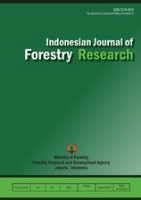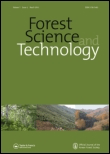
Forestist
Scope & Guideline
Innovating ecological research for a greener tomorrow.
Introduction
Aims and Scopes
- Sustainable Forest Management:
Research on practices, policies, and technologies that promote the sustainable use of forest resources while preserving ecological integrity. - Forest Ecology and Biodiversity:
Studies examining the relationships among forest ecosystems, species diversity, and ecological processes, emphasizing conservation strategies. - Climate Change Impacts on Forests:
Investigations into how climate change affects forest distribution, health, and ecosystem services, providing insights for adaptation strategies. - Urban Forestry and Green Infrastructure:
Exploration of the role of urban forests in enhancing urban resilience, biodiversity, and quality of life through nature-based solutions. - Forest Economics and Policy:
Analysis of economic aspects of forestry, including market trends, policy implications, and community engagement in forest resource management. - Agroforestry and Land Use Dynamics:
Research on the integration of trees into agricultural landscapes and the effects on land use, ecosystem services, and farmer livelihoods.
Trending and Emerging
- Nature-Based Solutions for Urban Resilience:
A notable increase in studies focusing on the integration of green infrastructure and nature-based solutions to enhance urban resilience to climate change. - Impacts of Climate Change on Forest Ecosystems:
Research addressing specific effects of climate change on forest species distribution and ecosystem dynamics is on the rise, underscoring the urgency of adaptation strategies. - Community Engagement in Forest Resource Management:
An emerging focus on understanding local community dependencies on forest resources and their role in sustainable management practices. - Technological Innovations in Forestry:
Growing interest in utilizing advanced technologies such as GIS, remote sensing, and modeling for improved forest management and research. - Ecosystem Services Valuation:
Increased attention on quantifying and valuing ecosystem services provided by forests, reflecting a broader recognition of their importance for biodiversity and human well-being.
Declining or Waning
- Traditional Timber Production Methods:
Research focusing solely on conventional timber extraction techniques has decreased, possibly due to a growing emphasis on sustainable practices and multi-functional forest management. - Species-Specific Wood Properties:
While still relevant, studies dedicated exclusively to the physical and mechanical properties of single tree species are less frequent as interdisciplinary approaches gain traction. - Historical Forest Management Practices:
Research exploring historical practices in forest management has waned, indicating a shift towards contemporary challenges and solutions in forestry.
Similar Journals

Indonesian Journal of Forestry Research
Elevating forestry research for a sustainable tomorrow.The Indonesian Journal of Forestry Research is a distinguished, peer-reviewed academic journal published by the Ministry of Environment & Forestry of Indonesia. With an ISSN of 2355-7079 and E-ISSN 2406-8195, this journal has been an Open Access platform since 2014, fostering international collaboration and knowledge sharing in the fields of ecology and forestry. As of 2023, the journal holds a respectable Q3 category in both Ecology and Forestry, reflecting its contribution to the science community. It ranks #99/174 in Forestry and #305/461 in Ecology in Scopus, indicating its growing influence in the respective fields. Aimed at researchers, professionals, and students, the Indonesian Journal of Forestry Research provides vital insights and findings, supporting sustainable forestry practices and environmental management in Indonesia and beyond. With an emphasis on innovative methodologies and applied research, this journal stands as a pivotal resource for those dedicated to advancing forestry science and ecological research.

BOIS ET FORETS DES TROPIQUES
Connecting Scholars for a Greener FutureBOIS ET FORETS DES TROPIQUES is a distinguished journal published by CIRAD-CENTRE COOPERATION INT RECHERCHE AGRONOMIQUE POUR, based in France. The journal is committed to disseminating high-quality research in the domains of ecology, forestry, and environmental science, reflected by its impressive ranking in multiple Scopus categories, including Q2 in Forestry and Q3 in Ecology. With an ISSN of 0006-579X and an e-ISSN of 1777-5760, BOIS ET FORETS DES TROPIQUES serves as a vital platform for scholars and practitioners to explore and share insights about tropical forests and their ecosystems. Although it operates under a subscription model without open access options, the journal plays a crucial role in advancing research and practices essential for sustainable forest management and biodiversity conservation in tropical regions. Its ongoing publication from 2010 to 2024 ensures a continuous contribution to the academic community, fostering a deeper understanding of ecological dynamics and promoting innovative approaches within the field.

ANNALS OF FOREST SCIENCE
Exploring the Depths of Forest EcosystemsANNALS OF FOREST SCIENCE, published by Springer France, stands at the forefront of ecological research, contributing significantly to both the fields of Ecology and Forestry, as evidenced by its prestigious Q1 ranking in both categories for 2023. Since its inception in 1999, this journal has become an essential resource for academics, practitioners, and students who are eager to explore the complexities of forest ecosystems and their interactions with global environmental changes. With an ISSN of 1286-4560 and E-ISSN 1297-966X, it disseminates cutting-edge research and critical reviews that enhance our understanding of forest science. Although it does not offer open access, the journal continues to be a pivotal platform for presenting innovative scientific findings that address the pressing challenges of forest management and conservation. Its significant impact factor reflects the high-quality contributions that have made a lasting mark on the discipline.

Sylwan
Empowering the dialogue on sustainable forest resources.Sylwan, published by POLSKIE TOWARZYSTWO LESNE, is a key journal in the field of forestry, focusing on the science and practice of sustainable forest management and conservation. Operating since 1979 and releasing issues periodically, including those from 2011 to 2018 and from 2020 to 2024, this journal plays a vital role in disseminating research and advances in forestry practices particularly relevant to Poland and the broader European context. While currently not offering open access options, Sylwan maintains a Q4 ranking in the forestry category according to the Scopus database, highlighting its dedicated niche within the scientific community. The journal serves as an essential resource for researchers, professionals, and students seeking to enhance their understanding of forestry issues in a global and ecological framework. With a commitment to promoting innovative research, Sylwan supports the ongoing dialogue on forestry management and policies, ultimately contributing to the sustainable development of forest resources.

REVISTA ARVORE
Elevating Forestry Practices through Open Access ResearchREVISTA ARVORE is a distinguished, peer-reviewed journal in the field of Forestry, published by Universidade Federal de Viçosa in Brazil. Renowned for its commitment to open access since 2002, this journal facilitates the dissemination of innovative research and knowledge to a global audience, encompassing topics from sustainable forest management to ecological conservation. With an impact factor reflective of its engagement in the community and a current Scopus ranking that places it in the 28th percentile among journals in Agricultural and Biological Sciences, it provides a vital platform for both emerging and established scholars. The journal is indexed under ISSN 0100-6762 and E-ISSN 1806-9088, making it accessible to a wide readership. As it converges its publication years from 2006 to 2024, REVISTA ARVORE aims to contribute significantly to the advancement of forestry science and practices, thereby encouraging environmental sustainability and innovation within the field.

CANADIAN JOURNAL OF FOREST RESEARCH
Connecting researchers to the heart of forest science.Canadian Journal of Forest Research (ISSN: 0045-5067, E-ISSN: 1208-6037), published by Canadian Science Publishing, stands as a leading platform for disseminating cutting-edge research in the field of forestry and ecological sciences. With an impressive impact factor and a steady reputation for high-quality publications, this journal occupies a prestigious position indicated by its Q1 ranking in Forestry and Q2 in Ecology as of 2023, alongside commendable placements in global and planetary change studies. Covering a broad scope from sustainable forest management to the impacts of climate change on forest ecosystems, the journal encourages submissions that address contemporary challenges and innovations in forest research. Operating from its base in Ottawa, Canada, the Canadian Journal of Forest Research has been a cornerstone of academic discourse since 1974, offering researchers and professionals vital access to pioneering studies that inform policy and practice in forestry. Researchers, educators, and students alike will find this journal an indispensable resource for advancing knowledge and fostering collaboration in the vital realm of forest research.

Journal of Forest Research
Advancing sustainable forestry for a thriving planet.Welcome to the Journal of Forest Research, a pioneering publication dedicated to advancing the field of forestry and sustainable ecosystem management. Published by Taylor & Francis Ltd and boasting an impressive Q2 ranking within its category, this journal highlights significant research contributions and innovative practices in forest science. With an ISSN of 1341-6979 and E-ISSN of 1610-7403, the journal spans a fruitful history from 1996 and continues to be an influential platform up to 2024. The Scopus rank places it at an esteemed #55 out of 174 in the realm of Agricultural and Biological Sciences, reflecting its high impact within the community. While this journal is not open access, it offers targeted content for researchers, professionals, and students seeking to deepen their understanding of forest ecosystems and promote sustainable practices. Join us in exploring the intricate relationship between society and forests, and contribute to a crucial dialogue on environmental stewardship.

FORESTRY
Empowering sustainable forestry through rigorous scholarship.FORESTRY is a prestigious journal dedicated to the advancing knowledge and innovative practices in the field of forestry, published by Oxford University Press. Established in 1927, it encompasses a rich history of scholarly contributions and has evolved to maintain its relevance, addressing contemporary issues and research in forestry and related disciplines. With an impressive Q1 ranking in the category of Forestry, this journal holds a notable position within the Scopus rankings, being placed 20th out of 174 in the Agricultural and Biological Sciences domain, highlighting its significant impact with an 88th percentile standing. Researchers, professionals, and students can access critical insights into forestry management, ecology, and policy, facilitating informed decision-making and fostering sustainable practices. While Open Access options are currently not available, the journal's rigorous peer-review process ensures the publication of high-quality research that contributes both to academic advancement and practical applications in forestry worldwide. The comprehensive coverage from 1927 to 2024 makes FORESTRY an invaluable resource for anyone invested in enhancing the field of forestry.

Forest Science and Technology
Exploring the intersection of forestry and technology for a greener future.Forest Science and Technology is a premier open access journal published by Taylor & Francis Ltd, based in the United Kingdom. Established in 2005, this journal has become a key platform for disseminating high-quality research in the fields of Forestry and Environmental Science, maintaining a strong impact factor and impressive Scopus rankings. As of 2023, it proudly holds a Q2 quartile ranking in Forestry and a Q3 quartile ranking in Management, Policy, and Law categories, highlighting its significance in addressing contemporary challenges in forest management and conservation. With a dedication to fostering scholarly communication, the journal supports open access since 2017, making valuable findings accessible to a wider audience, including researchers, professionals, and students. With the coverage period extending to 2024, Forest Science and Technology continues to contribute to the discourse on sustainable forestry practices and innovative management strategies.

Acta Silvae et Ligni
Connecting Global Minds in Forest Science and Wood InnovationActa Silvae et Ligni is a prominent open access journal dedicated to the field of forestry and wood science, published by the esteemed GOZDARSKI INST SLOVENIJE. Since its inception in 2013, the journal has been committed to disseminating high-quality research that provides valuable insights into sustainable forest management, wood properties, and environmental interactions. With its ISSN 2335-3112 and E-ISSN 2335-3953, it serves as a vital resource for researchers, professionals, and students alike, fostering academic collaboration and innovation. The journal’s commitment to open access ensures that research is freely available to a global audience, promoting knowledge sharing and driving advancements in the field. While awaiting formal Scopus rankings, Acta Silvae et Ligni is actively working to enhance its impact and reach, making it a crucial platform for those engaged in the study and management of forest resources.